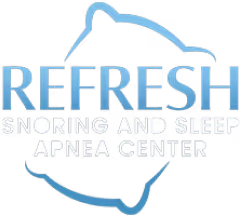More and more people are dealing with the challenges presented by insomnia symptoms. Persistent difficulty sleeping isn't just a minor inconvenience. Indeed, it casts a shadow on both nighttime rest and daytime activities.
Hence, recognizing these symptoms is a crucial first move to take control of sleep patterns. This article explores everything about insomnia, shedding light on what it involves, what causes it, and its differences from sleep apnea.
By breaking down the complexities of these sleep issues, you can find solutions that promise a good night's sleep.
What is Insomnia?
Insomnia, in simple terms, is a persistent challenge in achieving restful sleep. It goes beyond the occasional night of tossing and turning. Moreover, it's a regular difficulty falling asleep, staying asleep, or experiencing the kind of deep sleep that leaves us feeling refreshed in the morning.
When people experience insomnia, their world becomes silent, and everyone seems to be in deep slumber. However, they stare at the ceiling, unable to embrace the rest their body craves.
The causes of insomnia vary. But what sets it apart is its disruptive impact on our daily lives. It's not just about missing out on a good night's sleep. It's about the ripple effect it creates.
Various factors contribute to the onset of insomnia, ranging from stress and anxiety to lifestyle choices like irregular sleep patterns and excessive caffeine intake.
It's important to recognize insomnia not as a fleeting inconvenience but as a persistent condition that deserves attention and understanding.
What Causes Insomnia?
Its roots often intertwine with various factors. Understanding what causes it is crucial to addressing the issue effectively.
- Stress and Anxiety
The relentless demands of daily life can lead to heightened stress and anxiety, creating a cycle that interferes with sleep.
- Lifestyle Choices
Irregular sleep patterns and excessive caffeine intake can disrupt the body's natural sleep-wake cycle. Therefore, getting used to these things makes establishing a restful sleep routine difficult.
- Habits and Sleep Environment
Poor sleep habits are prevalent causes of insomnia. They can contribute to this sleep condition by hindering the body's ability to unwind and relax.
- Underlying Health Conditions
Depression and chronic pain disorders may lead to physical and mental health issues that trigger sleep disturbances.
- Shift Work and Jet Lag
Disruptions to the circadian rhythm caused by irregular work hours or rapid changes in time zones can result in sleep difficulties.
- Medical Conditions
Certain medical conditions may cause discomfort or difficulty breathing during sleep. Consequently, fatal insomnia may also arise due to cognitive issues.
- Age-related Changes
As individuals age, they may experience changes in sleep patterns, with insomnia becoming more prevalent due to altered hormone levels and increased sensitivity to environmental factors.
- Medications
Certain medications, like those affecting the central nervous system or have stimulating effects, may interfere with normal sleep patterns, leading to insomnia.
- Psychological Factors
Conditions such as PTSD or obsessive-compulsive disorder (OCD) can manifest in sleep disturbances.
Symptoms of Insomnia: How to Identify Them from Sleep Apnea
Insomnia manifests in various ways. Persistent difficulty initiating or maintaining sleep, waking up too early, and experiencing non-restorative sleep are telltale signs of insomnia.
The repercussions extend to the daylight hours, too. The condition brings irritability, chronic fatigue, impaired concentration, and diminished performance in daily activities.
Insomnia and sleep apnea share the common ground of sleep disturbances. Thus, it is crucial to differentiate the signs of insomnia and sleep apnea.
One key difference lies in wakefulness during the night. Insomniacs often find themselves lying awake, struggling to sleep. On the other hand, those with sleep apnea might experience brief awakenings due to interruptions in breathing.
Another distinguishing factor is the role of breathing patterns. Sleep apnea results in abrupt awakenings accompanied by gasping or choking. Meanwhile, insomnia revolves around the challenge of falling or staying asleep, with breathing patterns remaining consistent.
How to Treat Insomnia
Treating this condition involves a multi-faceted approach, addressing the behavioral and psychological aspects. Sleep hygiene can significantly improve sleep quality. It includes limiting caffeine intake and incorporating relaxation techniques before bedtime.
Cognitive-behavioral therapy for insomnia (CBT-I) stands out as a highly effective non-pharmacological intervention. This therapeutic approach targets maladaptive thoughts and behaviors related to sleep, helping individuals develop healthier sleep patterns.
In cases where lifestyle modifications and behavioral interventions prove insufficient, healthcare providers may cautiously explore pharmacological insomnia treatment options. Furthermore, healthcare professionals can also prescribe medications for short-term relief.
Improve Sleep Quality Today!
Refresh Snoring & Sleep Apnea Center offers tailored solutions beyond conventional remedies. We offer a lifeline for those yearning for rejuvenating sleep.
Our highly trained team has years of experience guiding individuals with sleep disorders. Undoubtedly, our knowledge and genuine dedication to fostering restful nights set us apart.
Choosing Refresh Snoring & Sleep Apnea Center means saying goodbye to insomnia symptoms and committing to reclaiming the nights. Embrace a future where rest is not just a dream but a tangible reality. Contact our team today to book an appointment!

.svg)




